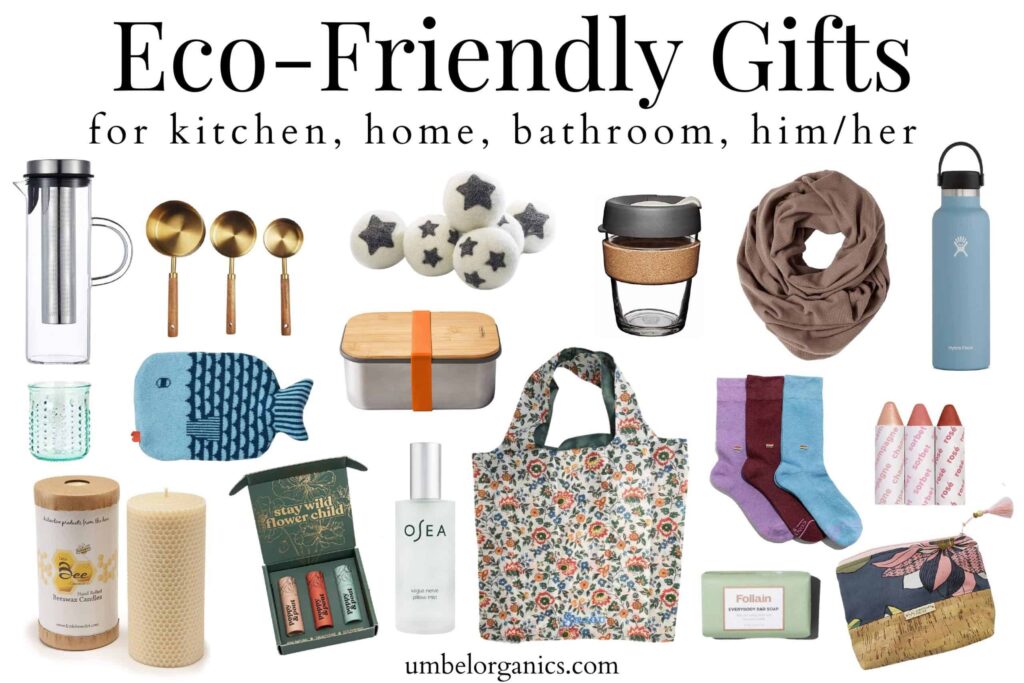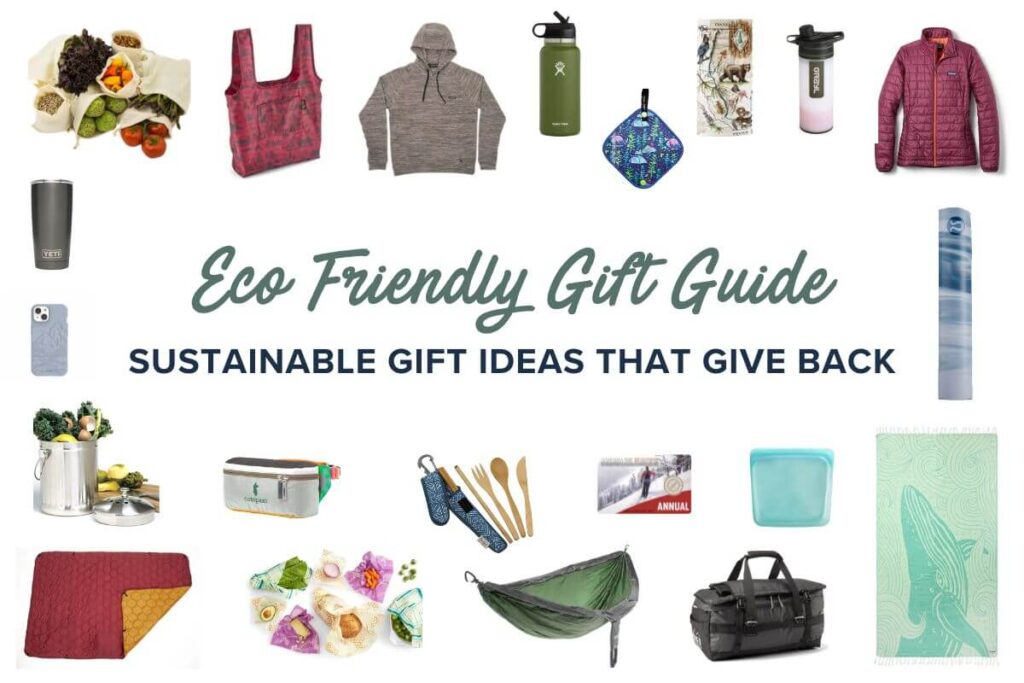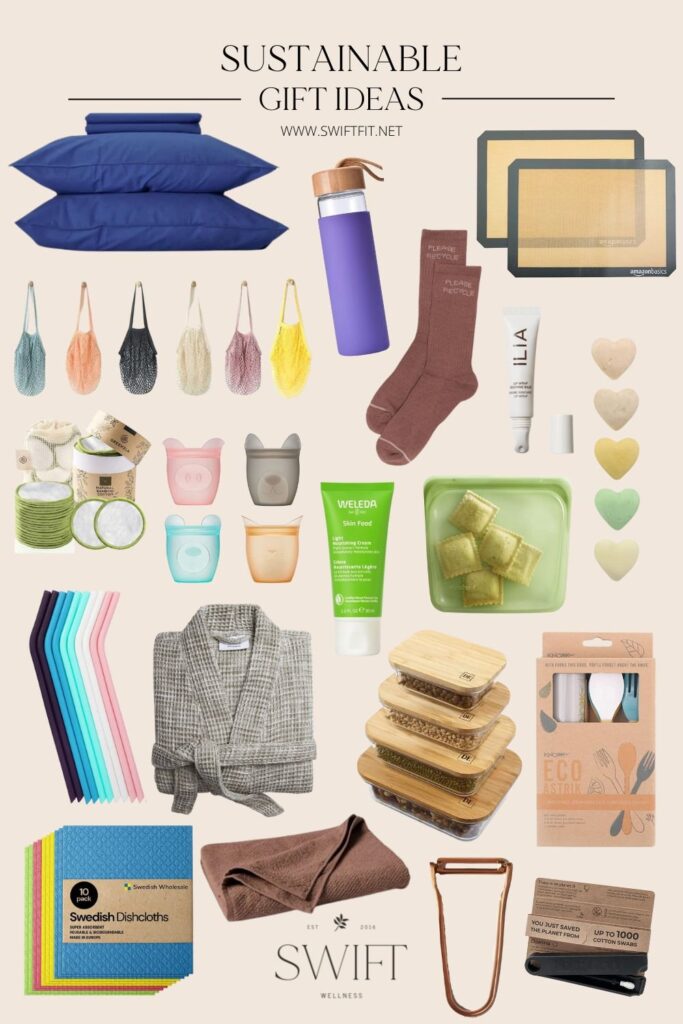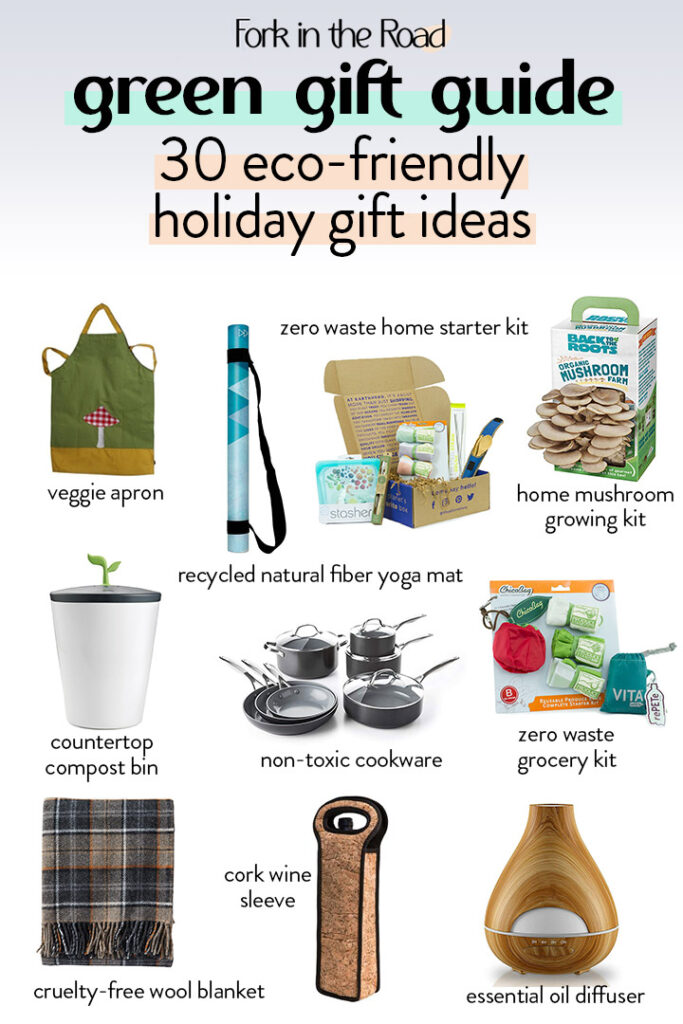
Sustainable gifts are becoming increasingly popular as people are becoming more conscious about their impact on the environment. These gifts are not only thoughtful and meaningful but also eco-friendly and socially responsible. From recycled materials and upcycled products to ethically sourced and fair-trade items, sustainable gifts prioritize reducing waste and supporting sustainable practices. By choosing sustainable gifts, you can show your loved ones that you care about them and the planet, making your gift-giving experience even more special and impactful.

This image is property of umbelorganics.com.
Definition and Importance of Sustainable Gifts
Meaning of sustainable gifts
Sustainable gifts are presents that are produced and sourced in a way that minimizes their impact on the environment and promotes ethical practices. These gifts are often made from renewable and eco-friendly materials, and they are designed to be long-lasting and reduce waste. Sustainable gifts can range from everyday items like reusable water bottles and coffee cups to unique and handmade products that support local artisans and communities.
Why sustainable gifts matter
Sustainable gifts are important for several reasons. Firstly, they help to reduce the environmental impact of gift-giving. By choosing gifts that are made from sustainable materials and produced in an eco-friendly manner, we can minimize the depletion of natural resources and the emission of harmful pollutants. Secondly, sustainable gifts support ethical practices and fair trade. When we purchase gifts that are ethically-produced, we contribute to creating better working conditions and fair wages for workers. Finally, sustainable gifts promote a circular economy. By choosing gifts that are durable and long-lasting, we encourage a shift away from the culture of disposable items and contribute to a more sustainable and resource-efficient society.
Types of Sustainable Gifts
Eco-friendly gifts
Eco-friendly gifts are products that are made from materials that have a minimal impact on the environment. These could include gifts made from recycled or upcycled materials, such as jewelry made from reclaimed metals or bags made from repurposed fabrics. Eco-friendly gifts may also include items that are made from renewable resources, such as bamboo or organic cotton products.
Ethically-produced gifts
Ethically-produced gifts are those that are made in a way that ensures fair treatment and wages for workers. These gifts often support artisans and communities in developing countries, providing them with opportunities for economic empowerment. Ethically-produced gifts can include handmade products, fair-trade items, or products from companies that prioritize transparency and ethical sourcing in their supply chains.
Plastic-free gifts
Plastic-free gifts are presents that are free from single-use plastic. These gifts promote the use of sustainable alternatives to plastic, such as stainless steel or glass containers, bamboo utensils, or beeswax wraps. By choosing plastic-free gifts, we can reduce our dependence on plastic and help to combat the issue of plastic pollution.
Zero waste gifts
Zero waste gifts are products that are designed to generate little to no waste throughout their lifecycle. These gifts often focus on reducing packaging waste and promoting reuse or recycling. Examples of zero waste gifts include refillable toiletry products, reusable cloth napkins, or compostable or plantable items.
Benefits of Choosing Sustainable Gifts
Reducing environmental impact
One of the key benefits of choosing sustainable gifts is the reduction of our environmental impact. By opting for gifts made from eco-friendly materials and produced in an environmentally-conscious manner, we can help to minimize the depletion of natural resources and the emission of greenhouse gases. Additionally, sustainable gifts are often designed to be durable and long-lasting, reducing the need for frequent replacements and further reducing waste.
Supporting ethical practices
Purchasing ethically-produced gifts allows us to support companies and artisans who prioritize fair trade, safe working conditions, and fair wages for their employees. By choosing these gifts, we contribute to creating a more equitable and sustainable global economy, where workers are treated with respect and given opportunities for economic empowerment.
Promoting a circular economy
Sustainable gifts promote the concept of a circular economy, where resources are used efficiently, products are designed for durability and repairability, and waste is minimized. By choosing gifts that are made to last and can be reused or recycled, we contribute to creating a more sustainable and resource-efficient society. This shift away from the linear “take-make-dispose” model can help to conserve resources and reduce the burden on the environment.
Educating and inspiring others
Choosing sustainable gifts can also be an opportunity to educate and inspire others about the importance of sustainability. By selecting gifts that align with our values and sharing the reasons behind our choices, we can raise awareness about the environmental and social impact of consumer choices. This can encourage others to consider sustainable options in their own gift-giving and everyday purchasing decisions.
Tips for Finding and Giving Sustainable Gifts
Researching brands and products
When looking for sustainable gifts, it’s important to do some research on brands and products to ensure they align with your values. Look for certifications or labels that indicate eco-friendly or ethical practices, such as Fair Trade, organic, or cruelty-free certifications. Read reviews and testimonials to get a sense of the brand’s commitment to sustainability and assess the quality of their products.
Prioritizing quality and durability
In order to ensure that your sustainable gifts have a long lifespan, prioritize quality and durability when making your choices. Look for products that are well-made and designed to withstand regular use. Invest in items that are made from high-quality materials and are built to last, rather than opting for cheaper, disposable alternatives. By choosing gifts that can be enjoyed for a long time, you reduce waste and the need for frequent replacements.
Choosing experiences over material items
Consider giving the gift of experiences rather than material items. Experiences, such as a spa day, concert tickets, or a cooking class, can create lasting memories and have a lower environmental impact compared to physical products. This can be a great way to provide a unique and sustainable gift while also supporting local businesses and artisans.
Making homemade or upcycled gifts
Get creative and make your own gifts or upcycle items to give them a new purpose. Homemade gifts add a personal touch and can be tailored to the recipient’s preferences. Upcycling involves transforming old or discarded items into something new and useful. This not only reduces waste but also gives new life to items that would have otherwise ended up in the landfill.

This image is property of bearfoottheory.com.
Examples of Sustainable Gifts
Reusable water bottles and coffee cups
Reusable water bottles and coffee cups are practical and sustainable gifts that help to reduce single-use plastic waste. Look for options made from stainless steel, glass, or BPA-free plastic. These items can be used daily and help to promote sustainable habits by encouraging the use of tap water or coffee made at home.
Organic and fair-trade clothing
When it comes to clothing, opt for organic and fair-trade options. Organic clothing is made from materials that have been grown without the use of synthetic pesticides or fertilizers, minimizing the impact on the environment and the health of workers. Fair-trade clothing ensures that the people who produced the garments were paid fair wages and worked in safe conditions.
Handmade and locally-produced items
Handmade and locally-produced items make unique and sustainable gifts. These products are often made with care and attention to detail, supporting local artisans and contributing to the local economy. Look for handmade jewelry, ceramics, textiles, or artwork that reflect the culture and traditions of the community.
Adopting an endangered animal
For a meaningful and symbolic gift, consider adopting an endangered animal on behalf of the recipient. Many organizations offer adoption programs where you can support the conservation efforts for a particular species. This not only raises awareness about the importance of wildlife preservation but also contributes directly to the protection of endangered animals and their habitats.
Sustainable Gift Ideas for Different Occasions
Birthdays
For birthdays, consider giving experiences such as a spa day, wine tasting, or a cooking class. If you prefer to give a physical gift, opt for items like reusable water bottles, organic skincare products, or sustainable kitchen gadgets.
Holidays
During the holiday season, consider sustainable gifts such as homemade jams or baked goods, reusable shopping bags or produce bags, or fair-trade chocolates and coffee. Be mindful of the excessive packaging that often accompanies holiday gifts and opt for minimal or plastic-free packaging options.
Weddings
For weddings, consider gifting experiences like a honeymoon fund or a cooking class for the couple. If you prefer a physical gift, choose items such as organic bedding, sustainable kitchenware, or ethically-sourced jewelry.
Baby showers
When attending a baby shower, opt for organic and fair-trade baby clothing and accessories. Consider gifting reusable cloth diapers or organic baby care products. You can also offer your time and support by organizing a meal train or offering to babysit.
Anniversaries
For anniversaries, consider giving the gift of a romantic weekend getaway or a couples’ spa day. You could also choose sustainable home decor, such as reclaimed wood furniture or fair-trade textiles. Personalized or custom-made gifts can also be a thoughtful and sustainable option.

This image is property of images.squarespace-cdn.com.
How to Wrap Sustainable Gifts
Using recycled or reusable wrapping paper
When wrapping sustainable gifts, opt for recycled or reusable wrapping paper. Look for options made from recycled materials or choose plain brown kraft paper that can be decorated with stamps or drawings. Avoid glossy or metallic wrapping paper, as these often cannot be recycled.
Using fabric or cloth wrappers
Another option for wrapping sustainable gifts is to use fabric or cloth wrappers. This can add a touch of elegance and can be reused for future gift-giving occasions. Furoshiki, a traditional Japanese wrapping cloth, is a great alternative to traditional wrapping paper and can be tied in various creative ways.
Decorating with natural elements
Consider using natural elements to decorate your sustainable gifts. This could include adding dried flowers or herbs, twine made from natural fibers, or incorporating small branches or pinecones for a rustic touch. These natural decorations can be composted after use, reducing waste.
Challenges and Criticisms of Sustainable Gift-giving
Limited availability and higher cost
One of the challenges of sustainable gift-giving is the limited availability and often higher cost of sustainable products. Eco-friendly and ethically-produced items may be less common in mainstream stores and can sometimes be more expensive due to the higher production costs associated with sustainable practices. However, as demand for sustainable products continues to grow, we can expect to see more affordable options becoming available.
The perception of ‘boring’ or less desirable gifts
Another criticism of sustainable gift-giving is the perception that sustainable gifts are less exciting or desirable compared to their conventional counterparts. This perception is often tied to the belief that eco-friendly or ethical products are limited in design or functionality. However, this is a misconception, as there are now many sustainable options that offer unique and stylish designs, while still prioritizing environmental and social responsibility.
Navigating cultural expectations
Navigating cultural expectations can also be a challenge when it comes to sustainable gift-giving. In some cultures, the value of a gift may be associated with its cost or extravagance, rather than its sustainability. It can sometimes be difficult to find sustainable alternatives that align with cultural traditions or gift-giving etiquette. However, by having open conversations and gently introducing the concept of sustainable gifts, we can help shift cultural norms towards more environmentally-friendly practices.

This image is property of www.forkintheroad.co.
The Future of Sustainable Gifts
Increasing consumer demand
The future of sustainable gifts looks promising, as we are witnessing an increasing demand for sustainable products across various industries. As people become more aware of the environmental and social impact of their purchases, they are seeking out options that align with their values. This growing consumer demand will likely drive innovation and the development of even more sustainable and eco-friendly gift options.
Innovation in eco-friendly and sustainable materials
The future of sustainable gifts will also see continued innovation in the development of eco-friendly and sustainable materials. Scientists and researchers are exploring alternative materials that have a minimal impact on the environment, such as biodegradable plastics, plant-based fabrics, or even materials derived from food waste. These innovations will present new opportunities for creating unique and sustainable gifts that are both stylish and environmentally friendly.
In conclusion, sustainable gifts are not only kind to the planet, but they also support ethical practices and promote a more circular economy. By choosing eco-friendly, ethically-produced, plastic-free, and zero waste gifts, we can reduce our environmental impact, support fair trade, and educate others about the importance of sustainability. By researching brands, prioritizing quality and experiences, and considering homemade or upcycled options, we can find and give meaningful sustainable gifts for different occasions. Wrapping these gifts with recycled or reusable materials and decorating them with natural elements adds an extra touch of sustainability. While there may be challenges and criticisms of sustainable gift-giving, the increasing consumer demand and innovation in sustainable materials indicate a promising future for sustainable gifts. So why not choose sustainable gifts and make a positive impact on the environment and society while spreading joy to your loved ones?
